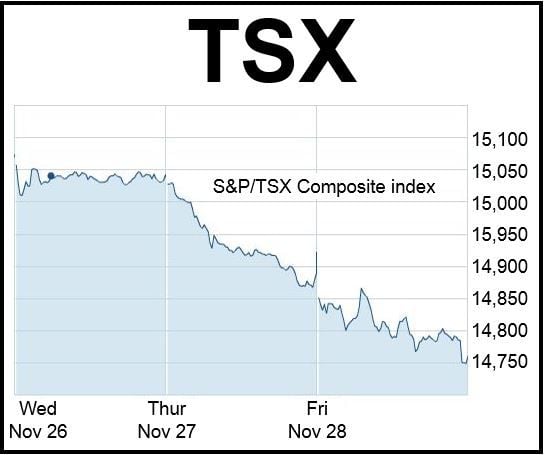The Toronto Stock Exchange’s SP/TSX Composite Index fell 116 points on Thursday and 177.74 on Friday to 14,744.7 as investors continued selling off energy stocks following the unrelenting decline in oil prices and concerns regarding the Chinese economy.
Major falls were seen in Precision Drilling (TSX:PD) and Pengworth Energy (TSX:PGF), with both falling nearly 13%.
At OPEC’s meeting in Vienna, Austria, earlier this week, it was decided to leave oil output unchanged at 30 million barrels per day, despite fierce lobbying by some members including Iran and Venezuela to reduce production.
Middle East oil producers, led by Saudi Arabia, opted to sit tight and let the market decide where the price of oil will go.
On Friday, crude on the New York Mercantile Exchange closed at $66.15 after falling $7.54, reaching a five-year low. The TSX energy sectors plunged by 2.25%.
Since June’s peak, oil prices have fallen by 35%, due to a strong dollar, rising shale oil production in North America, and weaker demand.
TSX fell throughout Thursday and Friday. (Source: Yahoo Finance Canada)
Experts on both sides of the Atlantic predict further declines in the oil price, given Saudi Arabia’s willingness to endure short-term pain in order to squeeze US producers.
Saudis can sit this one out
Saudi reserves exceed $1 trillion, i.e. they could survive easily for five years with virtually no oil income if they wanted to. US shale producers need high prices to make a profit. In an oil price war, the Middle Eastern OPEC members believe they would win.
The mining sector also had a bad Friday in Toronto. With copper falling $0.11 to $2.85 per pound, the base metals sector slid by 5.1%.
Declining oil prices mean falling inflation rates, which in turn was bad for gold. The TSX gold sector fell by more than 6%, with gold losing $21.40 to $1,175.20 per ounce.
Falling oil prices are forcing Canadian provinces to reconsider their finances. According to the Alberta government, a barrel of oil is expected to trade at an average of $75 per barrel for the rest of its fiscal year, ending in March 2015. Twenty-five percent of the province’s total revenue comes from the energy sector.
The Canadian dollar, which tends to follow oil and commodity prices, fell 0.75 of a cent on Thursday and 0.84 on Friday, ending the day at US$0.8741.
US stock markets remained fairly stable on Friday, having benefited from not trading on Thursday (Thanksgiving). The SP 500 Index fell 5.27 points to 2067.56, Dow Jones industrials rose 0.49 of a point to 17,828.24, and Nasdaq gained 4.31 points to 4791.63.

